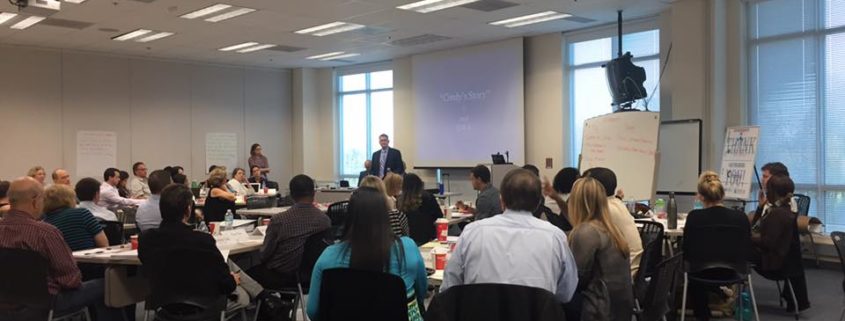Has Your Divorce Lawyer Completed an Introductory Collaborative Training?
If you are in the market for a divorce lawyer, you should know that not all divorce lawyers are the same. Some specialize in fighting in court, while others focus on resolving disputes outside of court. One way to help determine which strategy your divorce lawyer focuses on is to find out whether he or she has completed an Introductory Collaborative Practice Training.
What is An Introductory Collaborative Practice Training?
An Introductory Collaborative Practice Training is one of the first steps a lawyer or other professional takes before offering collaborative divorce services. Collaborative divorce is a process where the spouses agree that they will not use their attorneys to fight in court; rather the attorneys and any other professionals will focus solely on helping the family resolve their disputes and move on to their better future.
 An Introductory Collaborative Practice Training is generally an interdisciplinary training. This means that lawyers learn from and learn to work with mental health professionals and financial professionals. Of course, you may already realize that divorce has not only legal components but also emotional and financial components. This can be a pretty eye-opening concept for many divorce lawyers.
An Introductory Collaborative Practice Training is generally an interdisciplinary training. This means that lawyers learn from and learn to work with mental health professionals and financial professionals. Of course, you may already realize that divorce has not only legal components but also emotional and financial components. This can be a pretty eye-opening concept for many divorce lawyers.
Lawyers also learn to engage in interest-based negotiations. As opposed to traditional positional-based bargaining, interest-based negotiations focus on meeting each spouse’s needs rather than trying to win at all costs and at the other spouse’s expense. This style of negotiation is based on the Harvard Negotiation Project. It is outlined in the groundbreaking book, Getting to Yes: Negotiating Agreement Without Giving In, which is used by diplomats and business leaders when putting together deals.
These are just a few of the items learned in an Introductory Collaborative Practice training.
IACP Minimum Standards for Collaborative Practice Training
The International Academy of Collaborative Professionals (“IACP”) has set out Minimum Standards for Collaborative Practice Trainings. Those Standards are set out below:
IACP Minimum Standards for Introductory Collaborative Practice Trainings and Introductory Interdisciplinary Collaborative Practice Trainings
1. Introduction. These standards are established with an awareness of the aggregate nature of learning. Skill is acquired from actual application of education to experience over time and continuing education to enhance skill.
A trainer must be familiar with the following definitions, principles and standards adopted by the International Academy of Collaborative Professionals (IACP):
- Definition of Collaborative Practice
- Ethical Standards for Collaborative Practitioners
- Minimum Standards for Collaborative Practitioners
- Minimum Standards for an Introductory Collaborative Practice Training
- Minimum Standards for Collaborative Practice Trainers
A training in the Collaborative Practice process satisfies the Minimum Standards for an Introductory Collaborative Practice Training or an Introductory Interdisciplinary Collaborative Practice Training when it complies with the requirements prescribed herein. This training will introduce the Collaborative Practice process while recognizing that proficiency or skill cannot be attained from this training alone.
Trainers will familiarize participants with the theories, practices and skills so participants can begin to develop the self-awareness and understand the core requirements for effective Collaborative Practice.
2. Core Curriculum. Trainers will provide instruction to the participants on the following subjects:
(a) Process. The training will include the following subjects concerning process:
(1) The Collaborative Practice process as a structure to create working relationships to reach agreements and resolve disputes;
(2) The range of process options and Collaborative Practice professional team configurations available to clients given their situation;
(3) Organizational considerations in managing a Collaborative Practice matter, including—
(i) providing a structure, options, and protocols for the process;
(ii) managing the case within the structure established by the professionals;
(iii) setting expectations for clients and professionals;
(iv) defining issues and determining tasks; and
(v) planning, conferring and coordinating among professionals including premeeting and post-meeting briefings with the professionals and clients.
(4) Considerations when working as a team, including as an interdisciplinary team, and the contribution and role of each professional;
(5) Recognition of the emotional, financial, and legal elements of the clients’ conflict in all cases and how each element might impact the process; and
(6) The applicability of local law to the process.
(b) Skills Required for the Collaborative Practice Professional. The training will include the following subjects concerning skills:
(1) The professional’s responsibility to maintain a safe and productive environment for all;
(2) The professional’s responsibility to educate clients how to engage in productive behavior;
(3) The impact of professional language and modeling behavior to improve the clients’ ability to effectively participate in the Collaborative
Practice process;(4) The professional’s duty to assist the client in developing effective communication skills to enhance the prospects for reaching agreements
during the Collaborative Practice process and in the future;(5) The professional’s ability to effectively assess the capacity of the client for effective participation in the Collaborative Practice process;
(6) The professional’s awareness of power dynamics and imbalances that may exist in the Collaborative Practice process, the impact on the process, and how the professionals can address such issues; and
(7) The professional’s awareness of the need for assessment of coercive and violent relationships.
(c) Theory and Ethics. The training will include the following subjects concerning theory and ethics:
(1) Dynamics of interpersonal conflict. For trainings focused on domestic relations matters, divorce as a life transition and the dynamics of divorce, and for other family matters the impact of transitions on interpersonal dynamics and relationships;
(2) The future-focused decision-making orientation of Collaborative Practice. For trainings focused on domestic relations matters, concepts
related to restructuring families;(3) The difference between facilitative negotiation, including interest-based theory and methods as contrasted with positional negotiation, including rights-based theory and methods;
(4) Ethical considerations including the need to discuss carefully the available process options with the client, informed consent, integrity,
professionalism, diligence, competence, advocacy, and confidentiality;(5) Recognition that each professional has different ethical considerations;
(6) The role of the law as one of multiple reference points for decision-making. Other reference points include the interests and needs of each
client, each client’s sense of fairness, practical and economic realities, prior agreements, the goals of the clients, and cultural, emotional, and other factors; and(7) IACP standards that are applicable to practitioners, including Minimum Standards for Collaborative Practitioners and Ethical Standards for
Collaborative Practitioners.(d) Process Value and Costs. The training will include the following subjects concerning process value and costs:
(1) Understanding the broader interests which can be addressed in Collaborative Practice, including the long-term benefits of client self-
determination, reaching a durable agreement, preserving relationships, and the comparative economic and relational consequences of process choices;(2) Conveying to clients the value of Collaborative Practice including, where applicable, the value of an interdisciplinary professional team, as distinct from and together with consideration of professional fees and financial cost variables of process choices;
(3) Making realistic statements to clients about financial realities of dispute resolution processes, and the clients’ contributions to cost
containment throughout the process; and(4) Awareness that individual professional choices and behavior can have a significant impact on the efficiency, value, and cost of the process.
(e) Professional Teamwork. As used herein, a “team” can be any configuration of professionals, whether lawyers-only or interdisciplinary. The training will include the following subjects concerning professional teamwork:
(1) Professional team development, formation, configuration, and dynamics and the responsibility of each professional to establish and
maintain a collaborative environment;(2) The professional and interpersonal differences between working as an independent professional and working as part of a
Collaborative Practice team, including a team with members from different disciplines;(3) The nature of the roles and work performed by each professional discipline in an interdisciplinary Collaborative Practice matter, and how to
maximize the knowledge and skills of each team member, both individually and together, in order to effectively work on a matter; and(4) For professional team members from different disciplines, the specific boundaries and ethics common to each profession, and the unique
considerations these pose when working together as a team.(f) Practice Development and Practice Groups. The training will include the following subjects concerning practice development and practice groups:
(1) Initiation of Collaborative Practice matters in the professional’s unique communities, and the responsibility for each professional to develop his/her own practice;
(2) The benefits, structure and role of practice groups, and the individual responsibility for involvement in practice group activities;
(3) The importance of developing and expanding Collaborative Practice skills through additional trainings, experience, and interactions with
experienced practitioners, and how an Introductory Collaborative Practice Training serves solely as a foundation; and(4) The role of IACP as the international organization that promulgates standards and advances Collaborative Practice, and the resources IACP makes available to support practitioners.
3. Introductory Interdisciplinary Collaborative Practice Training.
(a) An Introductory Interdisciplinary Collaborative Practice Training shall meet all requirements of an Introductory Collaborative Practice Training
plus the requirements of this Section 3. The core curriculum for an Introductory Interdisciplinary Collaborative Practice Training is the same as the core curriculum for an Introductory Collaborative Practice Training.(b) In an Introductory Interdisciplinary Collaborative Practice Training in the area of domestic relations, the faculty will be composed of a minimum
of 1 professional from each of the legal, mental health, and financial disciplines. Otherwise, the faculty will be composed of those interdisciplinary professionals appropriate to the subject matter.(c) An Introductory Interdisciplinary Collaborative Practice Training should include instruction of participants from each discipline by members of each of the other disciplines.
4. Training Organization and Procedures
(a) Duration. An Introductory Collaborative Practice Training will be a minimum of 14 hours of classroom time (excluding break times) completed
over no more than 90 days, and preferably over 2 or 3 consecutive days. Participants will attend in person.(b) Methods. An Introductory Collaborative Practice Training should include multiple learning modalities – interactive, experiential, and lecture elements. Examples include demonstrations, role plays, small group exercises, interactive dialogues, fish bowls, and educational games.
(c) Materials. An Introductory Collaborative Practice Training should include written materials that are useful for reference and practice by the
Collaborative Practice practitioner after the training and will include the IACP Minimum Standards for Collaborative Practitioners and IACP Ethical Standards for Collaborative Practitioners.(d) Evaluations. An Introductory Collaborative Practice Training should include evaluations of the training and trainer(s) by the participants.
As mentioned above, any attorney whom you want to help you resolve things outside of court should, at a minimum, have completed an Introductory Collaborative Practice Training that meets these standards. And, if you are a divorce lawyer looking to attend an Introductory Collaborative Practice training, you can find a training near your below:
- In Florida: https://www.collaborativepracticeflorida.com/events/
- Elsewhere in the U.S. and around the world: https://www.collaborativepractice.com/community-event-calendar
Adam B. Cordover is a collaborative attorney and Florida Supreme Court Certified Family Law Mediator. He teaches attorneys, mental health professionals, financial professionals, and mediators how to engage in collaborative practice with the Tampa Bay Collaborative Trainers. He is also co-author of American Bar Association book on Building A Successful Collaborative Family Law Practice.








